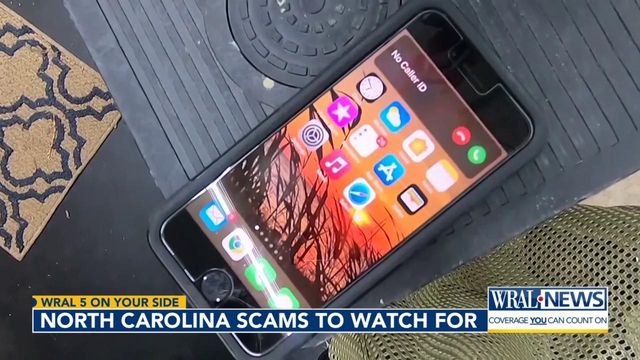NC residents lose millions to scammers: Report reveals top 10 scam categories
The 41-page report from the North Carolina Department of Justice examines artificial intelligence, the opioid crisis and its scam report.
Posted — UpdatedPeople in North Carolina are losing millions of dollars each year to scammers, according to a report from the state Department of Justice.
The most common types of scams include telemarketing and robocalls, motor vehicles, credit, utilities, home improvement, the internet, landlord-tenant issues, insurance, personal service and real estate.
In 2023, the North Carolina Department of Justice received hundreds and in many cases thousands of reports of scams in these arenas. Telemarketing and robocall scams were the most common, with 3,281 reports.
Here are some common phone scams:
“Grandpa, it’s me!”
A caller begins their conversation, “Grandpa, it’s me! The caller begs “please don’t tell my parents,” saying they’ve been arrested, hospitalized or have another crisis and they need you to send them money.
Secret shopper scam
You are invited to become a “secret shopper,” someone who gets paid for conducting business with a company and then evaluating its performance and are asked to test Western Union or moneygram wire transfer experience.
You are told to deposit a check into your account, wire 90% of the funds to a person located overseas, and fill out an online questionnaire about your experience.
Days after the deposit, your bank says that the check was counterfeit and that your account has been debited in the amount of the check.
Utility company cut-off scam
You are contacted by a person who claims to work as a utility company employee. The phony utility agent claims that your water, gas or electric bill is past due and that your service is about to be cut off.
You can prevent disconnection by paying your bill and late charges. This scam is frequently used against seniors. Don’t fall for it.
Other scams
These three scams just scratch the surface when it comes to the different types.
Never give anyone your personal information, and trust your gut if something feels off.
• Credits
Copyright 2024 by Capitol Broadcasting Company. All rights reserved. This material may not be published, broadcast, rewritten or redistributed.





